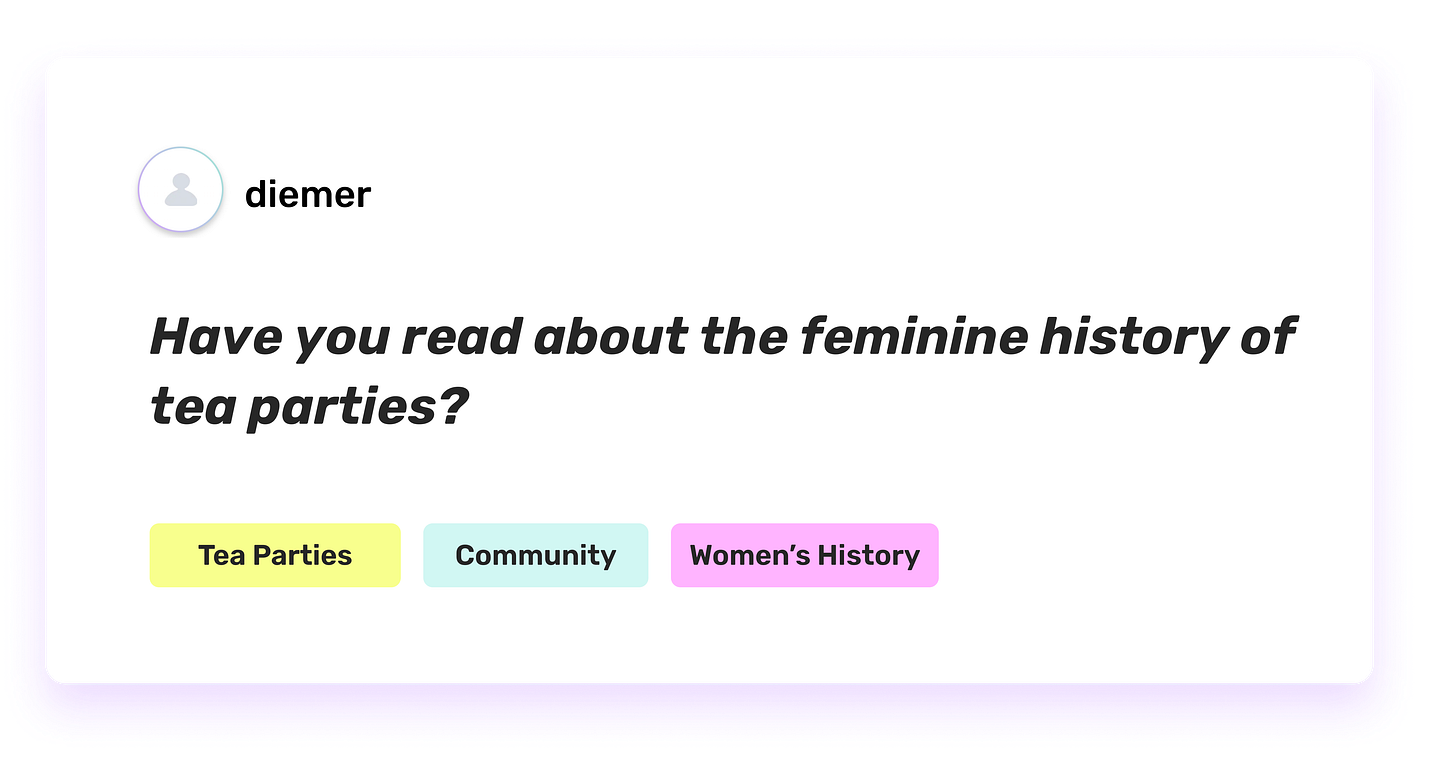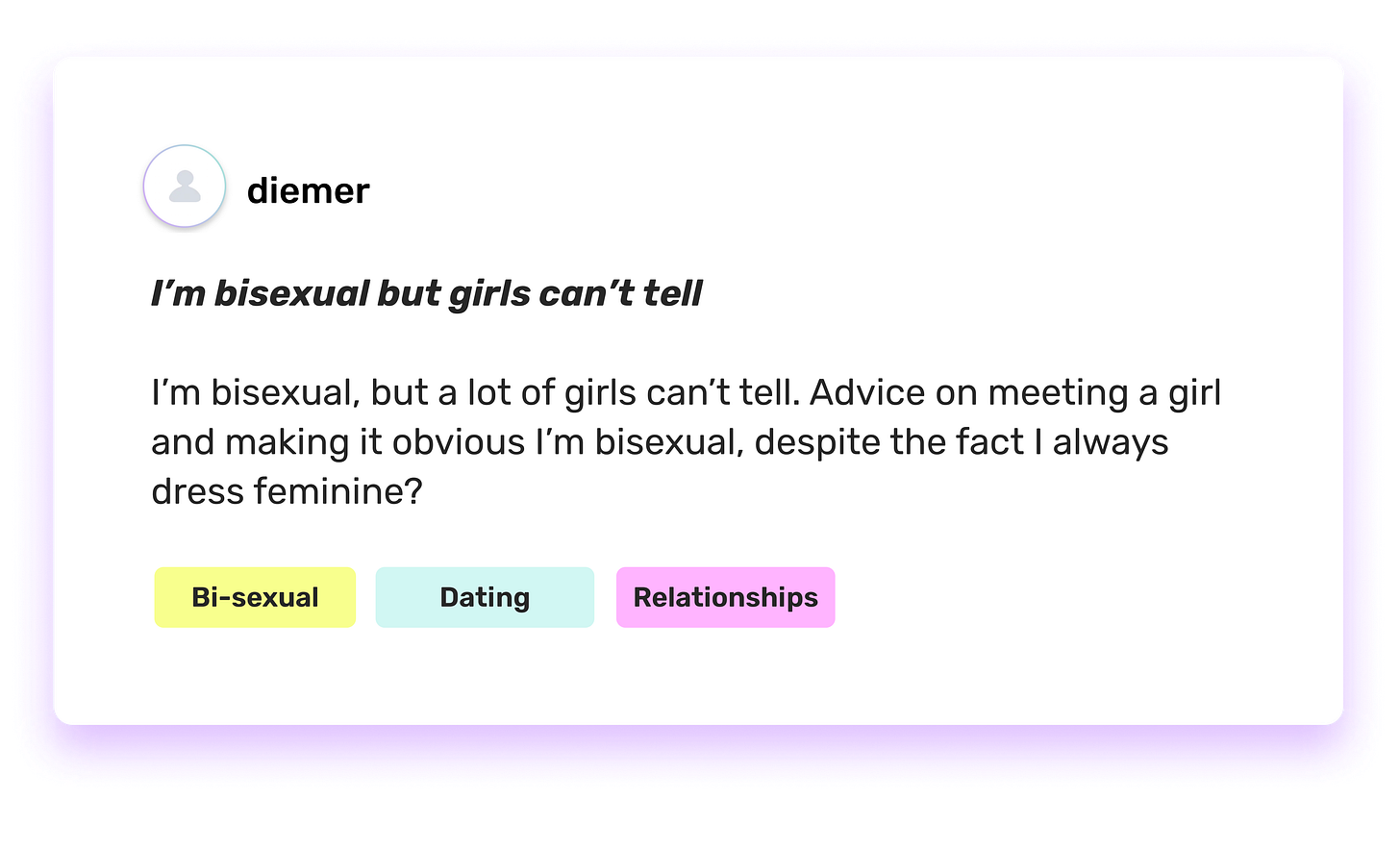Almost from the time tea was popularized in England in the 1600s by Charles II's Portuguese wife, Catherine of Braganza, tea drinking has been synonymous with female tittle-tattle. One reason for this was that "giving a tea" started out as an exclusively female ritual. But, mainly, it was good old sexism at work. Although men drank as much tea and gossiped as avidly as women, it was the latter who got stuck with the bad rap. — NPR
Let’s talk about the “tea” at tea parties. When tea, hot chocolate, and coffee were introduced to England in the 1600s, it was coffee that originally took off. By the 18th century, coffee houses were places that fueled Enlightenment conversations, but obviously, women were denied entry to them. So, as ever, women found alternate ways to gather and alternate beverages to sip on—tea parties in ladies’ drawing rooms were born.
At the time, these tea parties created spaces where middle-class women could find conversation and community. Funnily enough, across the pond and a few centuries later, tea rooms in America gave women their first break into the male-dominated restaurant industry—both as owners and patrons in the early 1900s. Prior to this time, women had been reluctant to challenge the rule that unescorted women were not allowed to be served in restaurants. Tea rooms started to provide a much-needed respite for female gatherings beyond the home.
“Hotel tea rooms were managed by men for the most part, but the small independent tea rooms that began in the 1910s were usually owned, operated and fully staffed by women, often times middle-class women…Because men would not work under the command of a woman, the owners had little choice but to hire all-women staffs — quite a novelty.” — Jan Whitaker, A Social History of the Tea Room Craze in America
From the 1600s onwards, literature was rife with derogatory references that associated “tea” with women talking. In Francis Grose’s 1785 “A Classical Dictionary of the Vulgar Tongue” he makes multiple comments. A few of these misogynistic gems include: "prattle broth," "chatter broth," "scandal broth," and "cat lap.” According to a lexicographer that NPR spoke to for their article on the same topic, “cat lap” could refer to a feline but it could also be “cat: a gossipy (old) woman since that sense was definitely in use in the late 18th century.” (Yet more evidence in my case that hating cats is misogynistic. I digress.) Additionally, you would be correct in thinking the word “bitch” was also wrapped up in the sexist terms that surround tea-making. “To bitch” was a colloquial way of saying “to make tea.” Its variations included “bitch the pot” in reference to the host of a tea party. The poet Robert Burns (an apparent close friend of Grose) also adopted Grose’s language in multiple poems in the same era, including using “scandal broth” and in The Twa Dogs: A Tale, which parodied high society women who present a facade of being as gracious as sisters but actually think spiteful thoughts while they “sip the scandal-potion pretty.” If you think they were bad, wait till you meet William Cobbett! He made the declaration in his book, Cottage Economy that, "The girl that has been brought up, merely to boil the tea kettle, and to assist in the gossip inseparable from the practice, is a mere consumer of food, a pest to her employer, and a curse to her husband if any man is so unfortunate as to affix his affections upon her.” The audacity.
Unsurprisingly, the derogatory associations of “tea” and “gossiping” have worked hand in hand to pass off the important conversations women have. There was (and still is) a genuine fear that when women are allowed spaces to talk amongst themselves, they will turn their backs on their patriarchal society. And honestly, these fears are backed up by a lot of evidence.
Crucial historical organizations and movements have often been thought up over tea—the women’s suffrage movement, the Girl Guides, the Women’s Institute, and the Seneca Falls Convention (the first women’s rights convention) to name a few. While there is a distinctly feminine history of tea, it’s important to note that, much like the history of “gossiping”, men at the time also gossiped and had tea parties. As ever, their gossiping and tea-drinking were simply viewed as more important.
You may now be thinking—wait is this why we say “spill the tea” when we want someone to share gossip with us? Interestingly, no. The phrase “spill the T” (later changed to “tea”) originated in Black drag culture in the U.S. At the time, it meant spilling the “truth.”
Idk about you but I’m going to make myself a cup of tea. Who wants to host a tea party? Have any thoughts on this? Let’s talk about it in Diem.
ATTENTION NYC DIEMERS! Are you free 6-8pm today? We’re hosting a book-ish salon at a secret (!) address in lower Manhattan. Here’s how to attend:
Respond to this diem in the app
DM us on Instagram or email our Head of Community, Amy Fraser, with a screenshot of your response (amy@askdiem.com) and we’ll give you the address
Bring a book that’s impacted you as a woman
Your Daily Briefing!
Get Your Daily Briefing of 10 conversations (like these!) sent to your phone every day. Join Diem via our web, iOS, or Android app!
JOIN DIEM! Have you joined the Diem community yet? Diem is designed to embrace the whims, questions, and hushed conversations that women have been having “behind closed doors” for centuries. Our community talks about topics just like this newsletter every day. Join us via web, iOS or Android.
VIBE CHECK! We rolled out an unauthenticated view of Diem last month, this means you can take a sneak peek at (anonymized) conversations happening in the app before creating an account ✨












Would you say a tax on tea was a declaration of war on women?